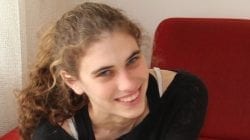Tuesday, February 2, 2016
For months now, terrorism has been raging in Israel. Not the sort of terrorism we encountered 15 years ago when every other day there were massive attacks and scores of people were murdered each month. Then, you never knew where the bomb would explode — on the bus, in the coffee shop? And if you lived in Judea and Samaria, you never knew if your car would be shot at. There were times when you really felt that just driving to work or running to town for some errands was a dangerous game of Russian Roulette.
Thank G-d, those days have not returned and we hope they never will. The terrorist attacks today are not as frequent and the victims are far fewer in number. There is an overall sense that going about your ordinary business, whether in Judea and Samaria or in the major cities, will not bring calamity.
But when we consider the people who have not been so lucky, whose lives were taken in such a brutal, senseless way, we cannot help but mourn them and mourn the hatred that continues to plague us from so many Arabs that live near and among us.
I didn’t know the two women who were murdered recently. I have never met the young woman who was stabbed but miraculously survived. But the newspapers and other media have been full of stories. I wish I had met Dafna Meir and Shlomit Krigman before they were so brutally murdered.
Dafna Meir had a very difficult childhood and from a young age was removed from her parents’ custody. But she was one of the lucky ones.
She found amazing love and support in a foster family, a family that treated her as their own. The parents of that family became her real parents, that family her real family. When she met Natan Meir, the man who would become her husband, she insisted that if they marry, they would not only strive to have their own biological children but that they would provide a warm and loving home for children whose parents could not raise them. Natan agreed immediately.
And, indeed, Natan and Dafna not only had four of their own children but took in two foster children. Dafna insisted that she wanted to do for these children what her foster parents had done for her. She wanted to save these children and shower them with the love that they could not get from their biological parents. How ironic that a woman who knew and offered so much love would be murdered by someone propelled by so much hate. Dafna was a neurosurgical nurse but had reduced her job load to spend time fixing up her home in Otniel. As she stood outside her front door painting the doorposts, she was attacked by an Arab teen-ager and stabbed to death. She managed to struggle with the terrorist, to scream for help, and in so doing, saved the lives of her small children inside. But her oldest daughter was on the scene when she was murdered.
Just a few hours later, a young pregnant woman was stabbed in Tekoa by another Palestinian teenager. She saw the terrorist approaching her but did not notice the knife. All she saw was a young boy and in her innocence, assumed he was approaching her to ask a question or perhaps seek directions back to his village.
Michal Froman is the daughter-in-law of the late Rabbi Menachem Froman of Tekoa, who dedicated his life to finding avenues towards peace between the Jewish residents of Judea and Samaria and their Palestinian neighbors. Michal’s mother-in-law, Hadassah Froman, was interviewed on TV after the attack and spoke of their belief that there are Palestinian Arabs who are against this terrorism and who understand that this violence harms them as well. Like Hadassah, Michal too believes in the basic goodness of all human beings, an admirable attitude that may well have prevented her from seeing the knife that was aimed at her chest. Thank G-d, Michal is recovering from her injuries and her unborn baby has been spared.
This week, tragedy struck again as Shlomit Krigman was stabbed to death by yet another Palestinian teen-ager in the community of Bet Horon in Samaria. Bet Horon is located on Route 443, a major artery which connects Jerusalem and Tel Aviv. It is not an isolated community by any means. Yet the surrounding Arab villages do present real dangers to their Jewish neighbors.
Shlomit grew up in Shadmot Mechola, a lovely community in the Jordan Valley, where her family still lives.
She did her national service year as a youth coordinator for the Bnei Akiva religious Zionist movement in Bet Horon, where her grandparents live. In fact, her grandparents were among the founders of that community. This past year, she had been living with her grandparents in Bet Horon, having finished her studies at the Ariel University. As I look at her photograph, I see a beautiful, smiling young woman. She was only 24 years old.
Shlomit and Dafna were buried next to each other in Jerusalem. And while hundreds joined the funeral procession and millions mourned this tragic loss, diplomats and leaders around the world had the audacity to blame Israel for the deaths of so many Palestinian teen-agers. Arab teen-agers who have learned hatred and violence in their homes and schools and who set out one day to murder. What kind of society raises up children to hate and murder? Thank G-d I am part of a society that raised up Dafna Meir, a woman who learned to love and could not give enough love to others. And Shlomit whose love shined upon all who knew her.
Shalom,
Sondra Bara


